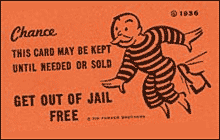As the days, months and years ticked by the Black Dahlia case grew as cold as an Arctic blast. In late October 1949 the cops received an anonymous telephone tip that a woman had been murdered in a downtown hotel, and that her killer was the same person who had murdered Elizabeth Short.
LAPD investigators rolled to the scene and what they found was sad, but it wasn’t murder. Upon examining her body Dr. Frederick Newbarr, county autopsy surgeon, determined that the woman had been badly beaten but that the beating had not been fatal. She’d been done in by a serious liver ailment caused by her heavy drinking.
Detectives searched the dead woman’s handbag and they found an ID card and other papers that revealed her to have been Mrs. Lucille Bowen, a former dancer in a Main Street burlesque house.
Also in Lucille’s handbag were a couple of police business cards; one of them belonged to Officer C.O. Smith and on its back was written “Lucille Bowen, a good friend of mine. Any courtesy extended to her will be appreciated.” A second card belonged to Officer R.E. Myers, it was apparently signed by him and had a similar inscription.
The cards were issued during the time that Smith was on the Central Division Vice Squad and Myers was assigned to administrative vice. By October 1949 Officer Smith had moved up the chain of command and was in charge of the vice unit at LAPD’s University Division. When quizzed by reporters Smith stated that he didn’t recall Lucille and he doubted the card was his. Myers had made detective, however reporters couldn’t reach him for comment.
 The two cops may not have recalled Lucille, but personally I have little doubt that the cards belonged to them, particularly since they’d worked vice. The business cards were probably never intended for use as “courtesy cards”; and I think it is likely that Lucille came into possession of the cards and then simply wrote on the backs of them. Lucille may have considered the cards to be talismans that could protect her from arrest, but if that’s what she believed she had been misinformed. Courtesy cards weren’t equivalent to a Monopoly “Get Out of Jail Free” card and wouldn’t have been much use to her.
The two cops may not have recalled Lucille, but personally I have little doubt that the cards belonged to them, particularly since they’d worked vice. The business cards were probably never intended for use as “courtesy cards”; and I think it is likely that Lucille came into possession of the cards and then simply wrote on the backs of them. Lucille may have considered the cards to be talismans that could protect her from arrest, but if that’s what she believed she had been misinformed. Courtesy cards weren’t equivalent to a Monopoly “Get Out of Jail Free” card and wouldn’t have been much use to her.
According to the hotel room clerk Ralph Myers (as far as I know he was no relation to the cop) Lucille had registered for a room the night before with an unidentified man — they’d signed in as Mr. and Mrs. James Johnson.
Police records revealed that years prior to her pitiful death Lucille had come to L.A. as Rena Lucille Hodge, a strikingly beautiful dancer from Oklahoma City with big Hollywood dreams. Like so many girls before her Lucille’s dreams had died hard, crushed in the crucible of Main Street burlesque joints.
![The LAPL database doesn't call her out, but I believe the woman in the center is none other than Betty "Ball of Fire" Rowland. [Photo courtesy of LAPL]](https://derangedlacrimes.com/wp-content/uploads/2014/01/00015298_betty-rowland-dressing-room.jpg)
The LAPL database doesn’t call her out, but I believe the woman in the center is none other than Betty “Ball of Fire” Rowland. [Photo courtesy of LAPL]
In December 1944 she was busted on Main Street with nine others on charges of contributing to the delinquency of minors by staging a lewd show. By the time her body was discovered in a Skid Row hotel Lucille had been reduced to life on “The Nickel” (Fifth Street) chasing her dreams with enough liquor to destroy her liver. It would have been easy for her to find male companionship in the dark bars along Skid Row — men who might listen to her stories of a movie career that never materialized for a few minutes before they would beat and use her.
Lucille’s death had not provided LAPD detectives with a much needed lead in the Black Dahlia case. In the nearly three years since Short’s murder a solution to the crime was still out of reach.


![The Follies on Main Street. [Photo courtesy of LAPL]](https://derangedlacrimes.com/wp-content/uploads/2014/01/00015293_follies.jpg)
![Interior of Skid Row Hotel. [Photo courtesy of LAPL]](https://derangedlacrimes.com/wp-content/uploads/2014/01/00041981_skid-row-interior.jpg)
![The "Nickel" (Fifth Street) at night. [Photo courtesy of LAPl]](https://derangedlacrimes.com/wp-content/uploads/2014/01/00041853_fifth-street-night.jpg)